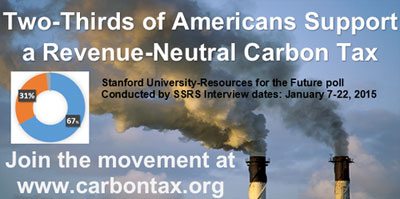As Alberta – land of tar sands oil and recent out-of-control wildfires – passed a carbon tax last week, the US House of Representatives passed a resolution banning it.
In Alberta, the tax passed 42-29.
Premier Rachel Notley says, “Albertans told us in the last election that they are worried about climate change, that they are worried about the state of the environment, that they are worried about Alberta’s reputation internationally and nationally, and that they are worried about their future as a result.”
Starting January 1, 2017, Albertans will pay a tax on heating bills and at the gas station. The $2.25 billion a year raised will be spent to diversify into efficiency, renewable energy, and public transportation. People with low incomes will receive rebates for the taxes they pay.
Some voted against the bill because of the lack of transparency, but they also favor the tax. The government wouldn’t consider amendments that would measure how the tax is performing and disclose the amount that’s added on gas receipts.
During the first year, the tax is C$20 ($14.93), rising to C$30 in 2018.
Over 80% of Canada’s economy will soon have a price on carbon.
On the Other Side of the Border
At the same time, House Republicans in the US passed a nonbinding resolution against a carbon tax.
No carbon tax is on the table, but just in case, they want everyone to know they oppose it. The vote passed 237-163, with support from 94% of Republicans. 6 Democrats voted in favor.
Sponsored by Majority Whip Steve Scalise (R-LA), the resolution says, “It is the sense of Congress that a carbon tax would be detrimental to American families and businesses, and is not in the best interest of the United States.”
Economists widely believe a tax is the most cost-effective, fastest way to make significant progress on climate change. The few conservatives that acknowledge climate change view it as a market-based approach to dealing with it without resorting to more regulations.
“This resolution spells out the harmful impacts that a carbon tax would have on American families by making the energy we all rely on every day more expensive,” says Scalise. “A carbon tax would intentionally increase the price of gasoline, natural gas, home heating oil, and electricity – driving up energy costs for families, reducing our nation’s GDP, and destroying American jobs.”
Clearly, he doesn’t understand how a carbon tax works: the revenue is returned to taxpayers through rebate checks.
In British Columbia, for example, the carbon tax is offset by lower income taxes. 61% of residents support the tax and businesses want it to be higher, according to The Guardian.
“Climate change requires all of us, including Republicans in denial, to come to our senses and to act on the challenge of climate change,” says Sander Levin (D-MI).
Climate legislation introduced by Bernie Sanders includes a carbon tax and he has pressured Hillary Clinton throughout the campaign to support it, but she has not. And it’s last on the list for climate denier Trump.
It’s frustrating, but proponents of a tax see the resolution as a reaction to the growing pressure in that direction. It’s at the point where the oil industry and House Republicans feel the need to dig in against it.
Heads of state from Canada, France, Germany, Mexico, Ethiopia, Chile, and the IMF and World Bank, are calling for an international carbon tax. India taxes coal and is one of 47 countries, including the EU, that have a tax or cap-and-trade system.
“There is a growing sense of inevitability about putting a price on carbon pollution,” says Jim Yong Kim, President of the World Bank. “Prices for producing renewable energy are falling fast, and putting a price on carbon has the potential to make them even cheaper than fuels that pollute our planet.”
Read our article, Americans Already Pay a Carbon Tax.
Learn more about carbon taxes: http://www.carbontax.org/

